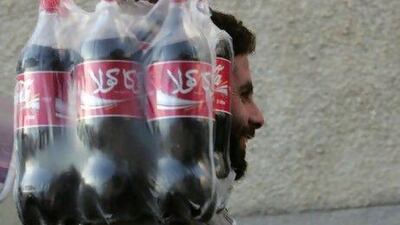Coca-Cola is gearing up to challenge regional rivals with its purchase of almost half of Aujan Industries, one of the Middle East's largest bottling and distribution companies.
Tomorrow's exclusives tonight:
Industry Insights e-newsletter Stay ahead of the pack and get the pick of the premium Business content straight to your inbox. Sign up
The deal, worth a reported US$980 million (Dh3.5 billion), comes as Coca-Cola tries to augment its global reach and redress its historical weakness in the Middle East. Competitors continue to enjoy a wide regional market-share advantage that dates back to an Arab League boycott that started in 1968 as a response to Coca-Cola's promise to open a plant in Israel. The boycott ended in 1991.
Coca-Cola said earlier this year it would invest $5bn in the Middle East and North Africa over the next decade, joining a growing list of foreign investors eyeing the region's stable consumer and retail market.
Aujan produces Rani juice drinks and Barbican, a non-alcoholic malt drink. It also holds regional rights to make and distribute Vimto, a cordial popular during Ramadan.
Coca-Cola, which already has bottling operations in Al Ain, is hoping the purchase will broaden its reach in a fast-growing market and give it a foothold in the lucrative juice drinks segment through its part-ownership of Rani.
Instead of investing organically and trying to build their brand in the juice drinks segment, they buy into the market leader," said Tom Emmet, the head of corporate finance and equity capital markets at Royal Bank of Scotland, which advised Aujan on the deal. "When this transaction closes, overnight Coca-Cola becomes one of the key shareholders in the market-leading company in this segment."
For Aujan, the deal gives it capital to expand its operations and potentially tap new markets. The company, which expects revenues to surpass $850m this year, sells its products in 70 countries and employs more than 2,500 people in the Middle East.
"We already have strong manufacturing and distribution capabilities in Saudi Arabia, the UAE, Iran and across the Middle East," said Sheikh Adel Aujan, the company's chairman.
"This infusion of capital will allow us to expand our manufacturing capacity further so we can meet consumer demand for our great brands. We hope to open two additional factories in the next five years - one in Iraq and the other in North Africa."
The terms give Coca-Cola a 49 per cent stake in Aujan's bottling and distribution operations. Aujan has plants in Saudi Arabia, Dubai and Iran, although the Iranian plant was not included because of sanctions imposed by the US, where Coca-Cola is based.
Coca-Cola will also acquire half of the company that owns Aujan's brand rights. But Vimto "will remain with the Aujan-managed bottling and distribution company" following the transaction's completion, according to a joint statement from the companies. Foreign investors have for years seen Middle Eastern food and beverages companies as ripe for investment, given the region's young population and growing consumer base.
The Middle East and Africa is one of the world's youngest and fastest-growing, with a population expected to exceed 1.5 billion by 2020. Food companies, moreover, are widely seen as defensive investments at a time of great turmoil in global markets.
"It's what we call a non-crisis-sensitive sector," said Paul Costers, the regional manager for Bureau van Dijk, a research firm. "It's like investing into health care. It doesn't mean you can invest in anything, but these sectors are less affected because people will always need food and medical services. A lot of these PE investors and their advisers are looking actively into these sectors."
Underlining the trend, the Carlyle Group, one of the world's largest private-equity companies, said yesterday it had acquired a 42 per cent stake in Alamar Foods, a family-owned Saudi company that franchises Domino's Pizza and Wendy's fast-food restaurants across the Middle East and North Africa, with the exception of Wendy's restaurants in Saudi Arabia. It has 185 restaurants in 11 countries, and also has a large food-processing division.
"In terms of the fast-food industry, even in very difficult times in the US during the last financial crisis, the quick-service restaurant sector was one of the few sectors that continue to do well," said Walid Musallam, a Carlyle managing director and head of Carlyle Mena Partners, its regional fund.
